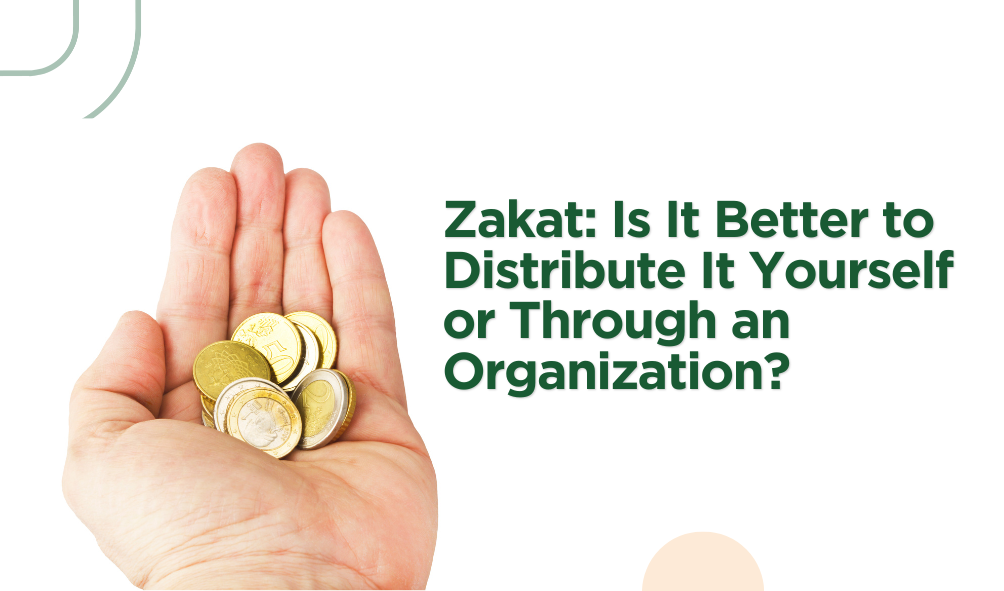Zakat: Is It Better to Distribute It Yourself or Through an Organization?
Every muslim who satisfies the requirements must pay zakat as one of the tenets of Islam. The Quran says:
“Take alms(Zakat) from their wealth to purify and cleanse them and pray for them. Indeed, your prayer is a source of comfort for them. And Allah is All-Hearing, All-Knowing.” (Surah At-Tawbah: 103)
But to do this deed, muslims must decide whether to distribute zakat directly to the recipients or through a zakat organization as it is a mandatory act of worship. Each approach has pros and cons that should be taken into account. This article will share the point of view from both way of zakat distribution and how the scholars opinion on it.
Direct Distribution of Zakat
When zakat is distributed directly there is no middleman involved instead the muzakki (zakat giver) delivers the money straight to the mustahik (zakat recipient). The primary benefit of this approach is that the muzakki can personally observe the effects of zakat and guarantee that it reaches the intended recipient.
Furthermore this strategy can improve the muzakki and mustahik’s social ties. Direct zakat distribution though is not without its difficulties. In accordance with Islamic law the muzakki must be sufficiently knowledgeable to determine who is actually eligible to receive zakat. Furthermore individual distribution might not be equitable which could lead to some mustahik receiving zakat more than once while others are excluded.
Also read:Finish Poverty with Zakat: How to do it?
Zakat Distribution via Zakat Organizations
Zakat organizations are establishments that follow Islamic law in the collection and distribution of zakat. The primary benefit of zakat distribution via an organization is the professionalism and efficiency of zakat administration. These organizations usually have thorough mustahik data which guarantees a more targeted and equitable zakat distribution.
Furthermore empowerment programs are frequently offered by zakat organizations to assist mustahik in achieving financial independence which increases the long-term viability of zakat. It also helps muzakki who dont have the time or expertise to distribute zakat themselves by entrusting it to an organization. Muzkki must however make sure that the selected organization is reliable and open in its handling of zakat funds. This is necessary to ensure that zakat is distributed to those who are actually eligible and in accordance with Islamic law.
Also read:Sustainable Management of Zakat Assets Based on Crowdfunding
Opinions from Scholars
Since the Prophets (ﷺ) companions frequently gave their zakat straight to the underprivileged. some scholars hold that doing so is lawful and has historical precedent in Islam. However entrusting zakat to an authority or organization that can distribute it to eligible recipients is also acceptable.
According to Fataawa al-Lajnah al-Daa’imah (9/457) those who distribute zakat directly should guarantee that it gets to the correct recipients. The distribution of their zakat in accordance with Islamic law is acceptable though if they entrust it to a reliable individual or group. In Fataawa al-Shaykh ‘Abd al-‘Azeez ibn Baaz (3/126) Shaykh Ibn Baz stressed that it is acceptable to entrust zakat to an organization or individuals as a token of cooperation in righteousness and piety provided that they are reliable and distribute it in line with Sharia.
Some of Islamic scholars also have alternative opinions that zakat of hidden wealth such as cash and gold should be disbursed by the owners of those wealth. Scholars are undecisive in their opinion whether the ruler or his delegates should gather and disburse zakat for publicly known properties like livestocks. It is generally advised that people distribute their own zakat to be safe if no authority guarantees equitable zakat distribution.
Also read:The Eight Categories of Asnaf: Who Qualifies for Zakat Distribution?
In conclusion
There are benefits and drawbacks to both distributing zakat directly and through a zakat organization. This approach can be used if a muzakki is knowledgeable and capable of distributing zakat directly and wishes to personally guarantee that it reaches the intended recipients. But if a muzakki lacks the time or knowledge and wants a more effective fair and sustainable distribution it makes sense to entrust zakat to a respectable zakat organization. Let’s pay our zakat and help muslim society with it.

Let’s Visit, Zeed and join for halal investment with Zeed.
References
Islamweb. (2000). Personally distributing Zakah. Diakses dari https://islamweb.net/en/fatwa/82519/personally-distributing-zakah
Islam Question & Answer. (2001). Giving zakaah to an organization so that they will distribute the zakaah to the needy. Diakses dari https://islamqa.info/en/answers/13064/giving-zakaah-to-an-organization-so-that-they-will-distribute-the-zakaah-to-the-needy
Islam Online. (2023). إخراج الزكاة عن طريق المؤسسات الخيرية. Diakses dari https://fiqh.islamonline.net
Rumah Zakat. (2023). Hukum Bayar Zakat Online: Apakah Sah?. Diakses dari https://www.rumahzakat.org/hukum-bayar-zakat-online-apakah-sah-yuk-simak-jawabannya







